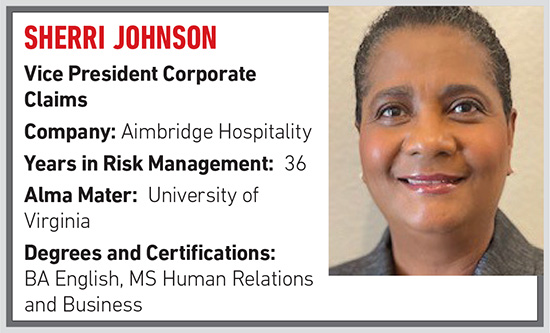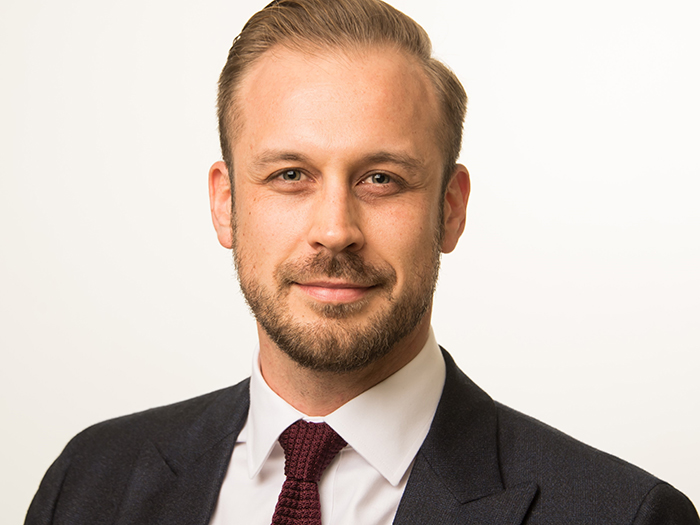Aimbridge Hospitality’s Sherri Johnson Shares Her Career Trajectory and What the Industry Can Do to Attract New Talent

R&I: What was your first job?
My very first job, I was 14 and I worked at Dairy Queen scooping ice cream. My very first professional job, I was a drug and alcohol counselor for the military when I first came out of college. And then my first insurance job, I worked for Crawford & Company.
R&I: How did you come to your current position?
I have been on the insured employer side for 30 years. I started working for an insurance carrier as a claims person, but not handling claims as much as doing the vocational assessment for workers’ compensation claims. Then, I got hired to oversee workers’ comp claims for a hospitality company, and I’ve been on the employer side ever since.
R&I: What’s been the biggest change in risk management and the insurance industry since you’ve been in it?
It has been ever evolving. The claims process really hasn’t changed that much. Our goal and role, as claims professionals working for businesses, is to control the costs of claims, protect a company’s assets, and provide employees with the proper level of treatment and care during an injury.
So, that hasn’t changed. I think what’s changed is you see more TPAs in the space now than you used to. It used to be that insurance carriers would have their own claims departments. The vendor services have expanded in my 30-some odd years in the field.
R&I: What’s the biggest challenge you’ve faced in your career?
I’m at the end of my career now, so I guess I can talk about challenges that I’ve faced before. It would probably be that the roles for insurance on the employer/insured side are very limited.
I think the challenge is always for folks who want to be in this field to find those opportunities. And sometimes those opportunities just don’t open up as easily because people get in and they stay in those positions for 20 or 30 years.
So, I think people need to be flexible in their careers and maybe they work a little bit on the TPA side, a little time on the carrier side and eventually get opportunities that present themselves on the employer/insured side.
R&I: Who has been your mentor(s) and why?
I’ve learned from everybody. I know some of my bosses have been my best mentors. Just in terms of learning from them, especially outside of the claims arena and in learning about insurance purchasing and safety and loss prevention and the areas that impact claims, but are not directly working a claim. So, I think I have to say it’s been my bosses. Chris Koppang is my current boss. I’ve worked for him for 13 years now and he’s been a phenomenal mentor for me.
R&I: What is the risk management community doing right?
I think they continue to be focused on innovation, trying to find products and resources to help mitigate the cost of risk for their companies.
Before COVID came along, people didn’t necessarily have to worry, as much as they are now, about how do you protect your customer population, as well as your employees? Before safety was mostly focused on employees, but now you’ve got a broader base that you need to be concerned about.
Risk management is constantly evolvoing and changing.There are new obstacles and challenges that you have to find resources, insurance plans, programs and products that will respond to those challenges.
R&I: What could the risk management community be doing a better job of?
I think we need to do a better job of succession planning. A lot of us are at the end of our careers and younger people want glitz and glamor jobs. Insurance doesn’t necessarily present that.
So, I think we have to do a better job at mentoring younger people who may be interested in the field, or just starting out in the field and really showing them the passion and the excitement you can have with a career in insurance and risk management. I think it’s up to those of us who’ve been around a while to really introduce and cultivate those next risk managers and claims managers out there.
R&I: How would you say technology has impacted the risk management profession?
It’s interesting because back when I started, there were no risk management information systems.
Now, you have risk management at your fingertips. Even smartphones now have the ability to have apps that are related to risk. So I think it’s just the development of technology. It’s made our jobs a lot easier.
R&I: What role do risk managers play in helping companies integrate after a merger?
I think it’s critical. Everybody talks about enterprise risk management. The need for that never becomes more apparent than when you’re merging two companies. Because you’re looking at two different loss histories. You’re looking at two different exposure bases. And so I think, when we looked at the merger, we had to look across the board at everything that could have been impacted in terms of risk and safety.
R&I: What’s your favorite book or movie?
My favorite movie is Imitation of Life. My favorite book, The Warmth of Other Suns.
R&I: What is your favorite drink?
I love a good cup of coffee. There’s nothing like it. It just starts your day or ends your day. It’s nice to sit and sip on it. Leisurely sipping on a cup of coffee on the beach would be my ideal.
R&I: What have you accomplished that you are proudest of?
I’m proudest of raising my son. I think that was the greatest accomplishment that I’ve ever done. He’s a wonderful young man. He’s actually in the insurance business, but I think raising him was my greatest accomplishment.
R&I: What is the riskiest activity you’ve ever engaged in?
Probably parasailing. I enjoyed it, but it was pretty dang risky. &










